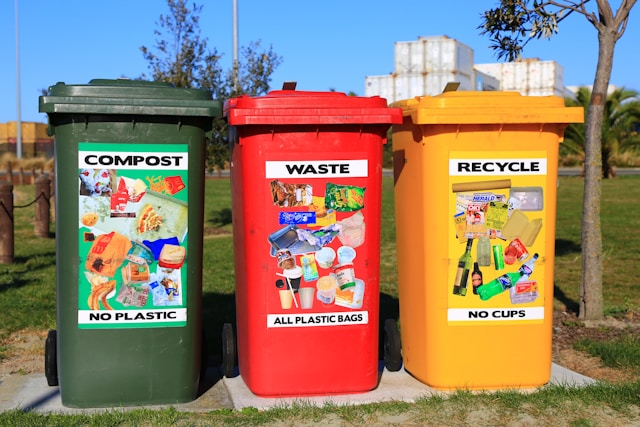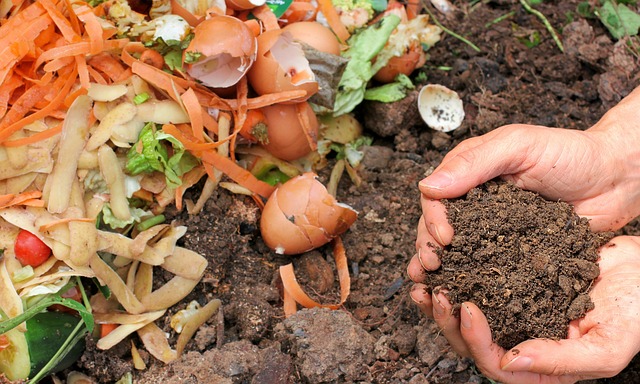Senate Bill: SB1383 and its Requirements

California’s Organic Waste Law Requires Businesses to Have Compost Bins
Article Summary: Senate Bill 1383 is new legislation that requires California jurisdictions to start offering collection services for organic waste and businesses to utilize these services or self-haul their organic waste. The requirements began in 2022 to reduce greenhouse gas emissions to help the state achieve its sustainability goals.
Your California business produces large amounts of food scraps, and for years, they found a home in your facility’s wastebaskets.
Not anymore.
These days, companies across the state must adopt composting practices based on the requirements of SB1383, a new Senate bill. This means those food scraps can no longer legally go in your regular trash cans. Let’s explore what this California organic waste law requires for various types of businesses across the Golden State and how you can ensure you remain in compliance in the years ahead.
SB1383 Requirements
Senate Bill 1383 is formally called California’s Short-Lived Climate Pollutant Reduction Law. This bill calls for a major decrease in the amount of organic waste disposed of in landfills. It became a law in the fall of 2016 and was put into effect in January 2022.
According to the bill, jurisdictions had to begin offering collection services for organic waste to all businesses and residents in 2022. These services are required to accept not only food scraps but also materials like yard waste. This bill was created with the aim of driving a 40% reduction in methane emissions by 2030 compared with 2013. It affects business owners, property managers, and residents.
Why Adhere to SB1383 Requirements?
SB1383 represents a key step in the Golden State’s waste reduction and sustainability goals. The bill’s aim is to decrease landfills’ methane emissions, as methane is a powerful greenhouse gas that plays a role in climate change. This is critical since California is experiencing many negative effects of today’s climate crisis, including the following:
- Increasing sea levels
- Extreme droughts
- Destructive fire seasons
- Hotter summer seasons
Organic waste from landfills produces around one-fifth of California’s methane, which is more than 80 times more powerful than the effects of greenhouse gas carbon dioxide over a two-decade period. When organic waste decomposes in landfills, this also produces PM 2.5 (fine particulates) and other air pollutants that may contribute to medical conditions like asthma. This is why reducing its production is a major priority for California political leaders.
California’s motivation for implementing Senate Bill 1383 is to decrease the disposal of organic waste by three-quarters by 2025 compared with 2014 levels as part of its efforts to accomplish its 2030 goal. That’s because organics like yard trimmings and food scraps constitute 50% of what people in California discard in landfills. The state also hopes to rescue 20% of the surplus food that is currently thrown away by 2025 so that people who need it can access it.
How to Be in Compliance With the Senate Bill
According to the SB1383 requirements, multifamily complexes and businesses must enroll in their jurisdictions’ curbside collection services or haul their own organic waste materials to specified facilities. The law applies to companies in several industries and covers numerous categories of organic waste, including the following:
- Leftover food from food processing facilities, restaurants, and employee cafeterias
- Branches, leaves, and grass clippings from companies with outdoor spaces
- Paper products soiled with food (e.g., cardboard, napkins, and paper towels)
- Biosolids (organic materials obtained from sewage, particularly in the agricultural field)
- Industrial waste (e.g., vegetable/fruit peelings, textiles, paper, pulp, and meat trimmings)

Penalties For Non-Compliance With SB1383 Requirements
Failure to comply with SB1383 in California may lead to financial penalties that the organization CalRecycle, the government body overseeing enforcement, can implement. This regulatory body focuses heavily on providing companies with the support and positive encouragement needed to comply with the Senate bill, but it also takes firm action against companies that are consistently non-compliant.
An initial violation of the California organic waste law may lead to a fine of $50 to $100. A second violation might result in a $100 to $200 fine within a year of violation number one. Continued non-compliance might lead to penalties as high as $500 within a year of a person’s most recent non-compliance penalty.
Compost Bin Options That Comply With the Senate Bill
If you plan to self-haul your organization’s organic waste rather than having your local jurisdiction handle this according to SB1383 requirements, you’ll need high-quality compostable bins.
For instance, take advantage of Rubbermaid Configure 1 Stream organic waste receptacles. These cans stand out for their durable steel construction and powder coat, which resists damage. Their magnetic connections and contoured edges are designed to keep multiple cans aligned with each other for a classy appearance, and their rounded feet make them effortless to move. Other noteworthy features of these organic waste cans include intuitive front doors for ergonomically removing materials and the ability to fit seamlessly into outdoor and indoor commercial settings. The cans can hold 15 gallons but there is a 23-gallon version available.
Another compostable bin is the Rubbermaid Sustain 15-gallon container. These bins feature color-coded labels and lids to simplify sorting, making composting and recycling more efficient. They’re also designed to hold up even in the most demanding commercial environments.
Don’t forget to purchase compostable can liners to go with your compostable bins. These bags are environmentally friendly due to being compostable, and they’re durable enough for heavy-duty use due to their thickness of 1.2 mil. The rolls are also coreless, conveniently saving on storage space in your utility closet.
Must-Have Compost Bin Labeling
Another major requirement of SB1383 is that jurisdictions offering organic waste hauling services for businesses in California must provide easy-to-read labels on container bodies or lids. These labels have to indicate the specific materials allowed or prohibited in various containers. California leaders require these labels to include images and/or text, which may be imprinted onto the containers or be stickers. The labeling is mandatory to ensure accurate organic waste sorting, promoting Senate Bill 1383 compliance.
Keep Your Facility SB1383 Compliant With Help From Unisan
At Unisan, we’re honored to be your go-to resource for all the supplies you need to maintain a clean and organized facility, including compost bins that comply with SB1383. Our family-owned, Los Angeles business has been operating since 1993.
Today, we stand out for our high-quality products, competitive pricing, friendly customer service, and commitment to client relationships. We’re not just another distributor: We’re your local neighbor and distributor in Southern California. Our priority is to develop personal relationships with you and every other company we do business with — you’re more than just a transaction to us. Keep in mind that even though we’re based in Los Angeles, we can deliver anywhere in the United States through our partners across North America.
If you have questions about our products, we’ll be glad to answer them and help you choose the right options for your facility’s unique needs. Create an account and maximize your budget by ordering bulk supplies from Unisan today!



